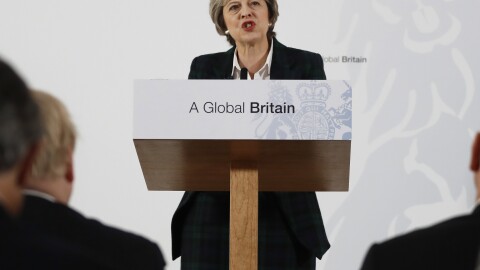In a bombshell announcement Monday, Scottish leader Nicola Sturgeon told reporters in Edinburgh that she will seek the authority to hold a second independence referendum for Scotland.
Citing a "brick wall of intransigence" from British Prime Minister Theresa May, Sturgeon asserted that the only way to preserve Scottish interests in the midst of the U.K. exit from the European Union is to put matters directly in the hands of Scottish voters.
"What Scotland deserves, in the light of the material change of circumstances brought about by the Brexit vote, is the chance to decide our future in a fair, free and democratic way — and at a time when we are equipped with the facts we need," the Scottish first minister and head of the Scottish National Party said in prepared remarks.
"Whatever path we take, it should be one decided by us, not for us."
Next week, she will seek a section 30 order from the Scottish Parliament to begin the referendum process — which the U.K. Parliament in Westminster ultimately must approve. If all goes as planned, Sturgeon expects that a vote would be held in the fall of 2018 or spring of 2019, after terms of a Brexit deal worked out by the U.K. and the EU become clear.
Nicola Sturgeon says Holyrood should choose "timing, franchise and question" of #indyref2 (although Electoral Commission could test latter)
— Philip Sim (@BBCPhilipSim) March 13, 2017
She told reporters Monday she expects that ballot to take the form of a simple yes-or-no vote. But the decision ultimately would be up to the Scottish Parliament.
Though Scotland held a referendum on independence in 2014 — a referendum that saw 55 percent vote to stay in the U.K. — Sturgeon argued that Scotland's situation has been changed dramatically by Brexit. In the June 2016 referendum that set the U.K. on a path toward departure from the EU, Scottish voters voted overwhelmingly to remain — to the tune of 62 percent to 38 percent.
In the wake of the Brexit vote, Sturgeon said she sought greater powers for the Scottish Parliament and the right to remain in the EU's single-market system, even if the U.K. does not. She said Scotland has been stonewalled on both.
"The language of partnership has gone, completely," Sturgeon said, though she signaled a willingness to continue negotiations with May.
Not all Scottish lawmakers back Sturgeon, however. In fact, members of Scottish Parliament from Labour and Conservative parties expressed firm resistance to the proposition.
"Nicola Sturgeon has today given up on acting as First Minister for all of Scotland," Scottish Conservative leader Ruth Davidson said in her official statement following Sturgeon's announcement.
"Today she has ignored the majority in Scotland who do not want a referendum and has decided instead to double down on division and uncertainty.
"The First Minister's proposal offers Scotland the worst of all worlds. Her timetable would force people to vote blind on the biggest political decision a country could face."
Ruth: "Nicola Sturgeon has today given up acting as First Minister for all of Scotland." pic.twitter.com/tCUpDop0Nx
— Scottish Conservatives (@ScotTories) March 13, 2017
That sentiment was echoed by the leader of Scotland's Labour Party.
"Scotland is already divided enough. We do not want to be divided again, but that is exactly what another independence referendum would do," Kezia Dugdale tweeted.
"Recent opinion polls have suggested there continues to be a narrow majority in favour of remaining in the UK — although the gap may have closed since Mrs May's speech outlining her plans for Brexit," the BBC reports, noting that in Parliament the proportions are reversed. Among lawmakers there, the pro-independence faction holds a narrow majority.
Meanwhile, the leader of the U.K.'s Labour Party expressed openness to a new referendum, even if he disagreed with it personally.
"If the Scottish Parliament decided they wanted to have a referendum then it would be wrong for Westminster to block it," Jeremy Corbyn told the BBC before the speech.
"But let's be absolutely clear, I do not think there should be another referendum, I think that independence would be economically catastrophic for many people in Scotland."
Sturgeon sees things differently.
"What is at stake is the kind of country we will become," she said. "It will be Scotland's choice. And I trust the people to make that choice."
Copyright 2021 NPR. To see more, visit https://www.npr.org. 9(MDA5NTM4MTIyMDE0MTg3NDc2MTVlZjdmNQ001))




